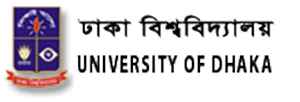Sustainable Development Goals

SDG 12: Responsible Consumption and Production
SDG 12: Responsible Consumption and Production
Sustainable Development Goal 12 focuses on responsible consumption and production to reduce environmental harm and promote sustainable resource use. Dhaka University (DU) has taken significant steps toward achieving this goal by adopting eco-friendly policies and encouraging sustainable practices on its campus. These initiatives reflect DU’s dedication to environmental responsibility and inspire students and the community to contribute to a more sustainable future. Key Initiatives include:
Shaping Future Leaders
- Raising Awareness Through Events:
- Sustainable Energy Week 2023 included seminars and discussions under the theme “Green City, Smart City,” educating students and faculty on renewable energy, eco-friendly practices, and the importance of sustainable consumption.
- These activities integrate sustainability into campus education, fostering environmental consciousness.
- Embedding Sustainability in Education:
- Through campus initiatives like waste management and renewable energy discussions, DU incorporates sustainability concepts into the learning environment, inspiring students to adopt responsible behaviours and practices.
Innovative Solutions for Tomorrow
- Innovative Solutions for Waste Management:
- Faculty members, such as Dr. Rumana A. Jahan and Dr. Hasina A. Simol, are researching on creating activated carbon materials from agricultural waste. This innovation is aimed at removing harmful dyes from textile wastewater, addressing pollution and promoting recycling.
- Focus on Renewable Energy:
- Research projects explore renewable energy solutions, aligning with DU’s broader goals of reducing carbon emissions and advancing sustainable energy usage.
- Waste-to-Resource Innovations:
- DU supports research that transforms agricultural waste into valuable resources, emphasizing the role of academic inquiry in achieving sustainability.
Sustainable Campus and Practices
- Innovative Solutions for Waste Management:
- Faculty members, such as Dr. Rumana A. Jahan and Dr. Hasina A. Simol, are researching on creating activated carbon materials from agricultural waste. This innovation is aimed at removing harmful dyes from textile wastewater, addressing pollution and promoting recycling.
- Focus on Renewable Energy:
- Research projects explore renewable energy solutions, aligning with DU’s broader goals of reducing carbon emissions and advancing sustainable energy usage.
- Waste-to-Resource Innovations:
- DU supports research that transforms agricultural waste into valuable resources, emphasizing the role of academic inquiry in achieving sustainability.
Empowering Communities for Change
- Collaborative Sustainability Efforts:
- DU partnered with the Sweden Alumni Network and the Swedish Embassy during the launch of its plastic-free initiative, showcasing its ability to engage diverse stakeholders for sustainability.
- Recycling Contributions:
- By supporting Dhaka city’s recycling efforts, where 37.2% of plastic waste is recycled, DU plays a vital role in improving urban waste management.
- Inspiring Broader Action:
- DU’s sustainability initiatives—such as waste management, renewable energy advocacy, and recycling programs—serve as models for local communities and other institutions, promoting responsible consumption and production on a larger scale.
Conclusion
These efforts demonstrate and inspire a culture of sustainability that extends beyond its campus, encouraging collective action for waste management, resource conservation, and sustainable energy use.

